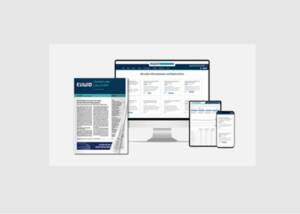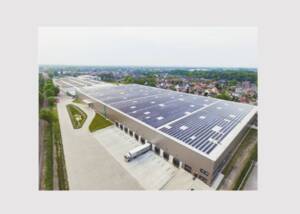SIG: Strong 2020 performance demonstrates business resilience
News General news
Full year 2020 highlights:
- Core revenue up 5.5% at constant currency; up 1.7% as reported

- Adjusted EBITDA margin 27.4% (2019: 27.2%): slight increase despite currency headwind
- Adjusted net income up 7% at €232.3 million
- Strong free cash flow of €233.2 million after investments in fillers and new production plant
- Proposed dividend increase of over 10% to CHF 0.42 per share
Samuel Sigrist (photo), CEO of SIG Combibloc, said: “As we look back on the unprecedented events of 2020, we can be proud of what SIG has achieved. The early implementation of a global pandemic preparedness plan, starting in China, allowed our factories to keep running throughout the COVID-19 crisis. The commitment and dedication of employees throughout the year enabled us to continue serving our customers, helping them to deliver essential nutrition to consumers.
The year was proof of the robustness of our business model and the resilience of our end markets. Core revenue growth of 5.5% at constant currency illustrates the portfolio effect created by our deliberate geographic diversification of the business over many years. We continued to win new business and to expand our global footprint with the construction of a new plant in China, which is now in operation. We also announced the planned acquisition of the remaining 50% of our Middle East & Africa joint venture. This transaction will expand our presence in growth markets and enable us to fully consolidate a business with an attractive financial profile.
Through the favourable environmental footprint of our packs, we are already helping our customers to meet the growing societal demand for environmental stewardship. It is our mission to create food packaging that gives back to the people and the planet by centring our sustainability programme on four positive, far-reaching actions: Forest Positive, Climate Positive, Resource Positive and Food Positive. This means planting trees to expand forests; taking carbon from the atmosphere; creating resources for future generations; and ensuring nutrition comes safely to ever more people. We believe this programme will further enhance the value of our offering to customers while bringing us closer to realising our vision of a net positive food packaging system.
Our track record on sustainability is evidenced by our Platinum rating from EcoVadis, which puts us in the top 1% of companies evaluated.”
Revenue by region: 2020
All regions contributed to constant currency growth in 2020. For the Americas and, to a lesser extent, Asia Pacific (APAC), the depreciation of local currencies against the Euro resulted in reported revenue declines. The strong constant currency growth in Europe and the Americas reflected increased at-home consumption during COVID-19 lockdowns. The Americas growth also included a significant contribution from filler placements with new customers. In APAC, where a large proportion of sales are for on-the-go consumption, lockdowns had a negative impact. This was exacerbated in the fourth quarter by lower stock-building by customers as the effects of the pandemic continued to be felt in South East Asia. APAC revenue includes the full year consolidation of Visy Cartons in Australia, acquired in November 2019.
EBITDA and adjusted EBITDA
Adjusted EBITDA increased to €498.3 million and the adjusted EBITDA margin increased slightly to 27.4%. Operational leverage, lower raw material costs and production efficiencies more than offset a negative impact from the depreciation of key currencies, notably the Brazilian Real, against the Euro.
The progression of the adjusted EBITDA margin in EMEA reflects the strong revenue growth and resulting production efficiencies. In APAC the weaker growth had an impact on margin, and both APAC and the Americas were affected by negative currency movements.
EBITDA was €449.7 million compared with €479.7 million in 2019. The decline was due to impairment losses relating to production-related assets of the Whakatane paper mill in New Zealand.
Net income and adjusted net income
Adjusted net income increased to €232.3 million from €217.4 million in 2019. The increase reflected the improvement in adjusted EBITDA and lower interest expense.
Net income was €68 million compared with €106.9 million in 2019. In addition to the impairment losses mentioned above, net income included foreign exchange losses on inter-company loans and costs relating to the early repayment of term loans as part of the debt refinancing effected in June 2020.
Dividend
At the Annual General Meeting to be held on Wednesday 21 April 2021, the Board of Directors will propose a dividend distribution out of the capital contribution reserve of CHF 0.42 per share for the year 2020 (2019: CHF 0.38 per share). This increased dividend will be paid on a higher number of shares (17.5 million new shares) following the transaction with the Obeikan Investment Group described below.
Capital expenditure
Gross capital expenditure was €199 million in 2020 (2019: €182 million). The increase reflected investments in production equipment for the new sleeves plant in China, which has been constructed close to the existing plant in Suzhou. Gross filler capex was broadly stable despite the challenging environment. Net capital expenditure (net capex) was €145 million compared with €110 million in 2019, as upfront cash for fillers received from customers returned towards more normal levels. The ratio of net capex to revenue was 8.0%, just within the target range of 8–10%.
Free cash flow
Net cash from operating activities was slightly lower due to additional tax payments and costs incurred for the debt refinancing. Free cash flow generation was strong despite the increase in capital expenditure and higher lease liability payments.
Refinancing and leverage
On 19 June 2020 a debt refinancing was completed, replacing two existing term loans with a new sustainability-linked term loan and two issues of Notes. A new €300 million revolving credit facility (RCF) was also established. The lower interest on the new bank facilities and Notes reduced the Group’s average cost of debt to 1.6% at end-December 2020. The refinancing allowed a move from a secured to an unsecured debt structure on typical investment grade terms and extended the overall maturity profile.
Net leverage stood at 2.7x at the year end, slightly below the 2019 level. The higher level of gross debt reflects increased lease liabilities, including those relating to the new sleeves plant in China. The strong free cash generation resulted in a significant increase in cash and cash equivalents to €355 million.
Acquisition of remaining 50% of Middle East & Africa joint venture
In November, SIG Combibloc signed an agreement to take full ownership of its Middle East & Africa joint venture SIG Combibloc Obeikan by acquiring the 50% shareholding of its partner Obeikan Investment Group (OIG). The completion of the transaction is expected in the first quarter of 2021 subject to customary closing conditions. The acquisition will expand SIG’s global presence and enhance its medium and long term growth outlook.
The transaction will be funded through a combination of newly issued SIG shares (from authorised share capital) and available cash balances and credit facilities. The impact on leverage will be marginal. OIG will receive around 17.5 million SIG shares, equivalent to a stake of approximately 5% of SIG’s share capital on a pro-forma fully diluted basis, and a cash consideration of €167 million for its 50% stake in SIG Combibloc Obeikan.
Decision to close Whakatane paper mill
The Group has been assessing the continued viability and different strategic alternatives for its paper mill in New Zealand (Whakatane). The mill primarily produces liquid paper board for use by SIG entities and the Group’s joint venture in the Middle East. As a consequence of the assessments, impairment losses of €38 million on production-related assets were recognised in the consolidated statements for the year ended 31 December 2020.
The Board of Directors has made the decision to close the paper mill and the Company will enter into the required consultation process with employees. The mill would need significant investment to maintain its viability and the Group will benefit from expanded sourcing opportunities with its existing third-party suppliers of liquid paper board. As a result of the closure decision, management expects to recognise plant decommissioning costs and redundancy costs of around €30 million in the first half of 2021. As assets of the mill are monetised over time, the free cash flow impact of these costs is expected to be reduced to approximately €15 million, of which €10 million would be the cash flow impact in 2021. The benefits of the closure are expected to result in a pay-back period on the cash outflows in line with the Group’s normal standards.
Nominations to the Board of Directors
The Board of Directors proposes the re-election of the Chairman and all other current members of the Board of Directors at the Annual General Meeting (“AGM”) to be held on 21 April 2021.
Furthermore, the Board of Directors proposes Ms Martine Snels for election to the Board of Directors at the AGM. Martine Snels has more than 20 years’ experience in the food industry and from 2015 to 2017 was COO Ingredients (B2B) at FrieslandCampina. Subsequently she was responsible for regions and countries on the Executive Board of GEA, a major supplier of engineering and processing equipment for the food and beverage industry. Martine Snels is a Belgian citizen and holds an MSc in agricultural engineering from K.U. Leuven.
As previously announced, subject to completion of the Middle East & Africa joint venture transaction, the Board of Directors has nominated Abdallah Al Obeikan, Chief Executive Officer of OIG and currently Chief Executive Officer of SIG Combibloc Obeikan, for election to the Board of Directors at the AGM. This will enable SIG to build on the success of the trusted partnership over the last 19 years and to continue to benefit from the strong local presence and expertise of OIG.
2021 outlook
SIG will continue to focus on profitable growth by expanding its business with existing and new customers and further developing sustainable solutions. In 2021, the Company expects to fully consolidate revenues in the Middle East & Africa from the beginning of March, subject to final completion of the transaction. On a like-for-like basis, the combined business is expected to achieve core revenue growth at constant currency in the lower half of the 4-6% range, taking account of the continuing restrictions in South East Asia affecting on-the-go consumption and general uncertainty about the ongoing global effects of the COVID 19 crisis. This represents an acceleration of the organic growth rate compared with 2020 excluding the effect of consolidating Visy Cartons.
Assuming no major deterioration in exchange rates, the adjusted EBITDA margin, including the consolidation of the Middle East & Africa business, is expected to be in the 27-28% range. Net capital expenditure is forecast to be within the targeted 8-10% of revenue range in 2021.
The Company maintains its medium-term guidance of core revenue growth of 4–6% at constant currency and an adjusted EBITDA margin of around 29%. Net capital expenditure should remain within 8–10% of revenue. The Company plans to maintain a dividend payout ratio of 50–60% of adjusted net income while reducing net leverage towards 2x.










